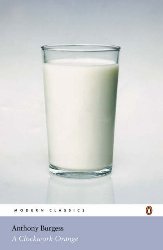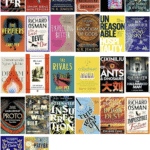
A Clockwork Orange
For those of you who haven’t read it, I’ll summarize – Alex is part of a teenage gang in a future society where crime is out of control. They spend their days beating up men and raping women, and Alex is also a big fan of classical music. Beethoven’s Ninth especially. Eventually he is caught by police and after a few years in prison is ‘cured’ of his violence using a form of brainwashing so that any time he has violent thoughts he feels sick and is unable to do it. By the end, after having been beaten up several times, he tries to commit suicide after being unable to even enjoy his music anymore. Somehow, the suicide attempt (he jumps out of a window) reverses the treatment but over time he matures and decides to ‘grow up’ of his own free will.
(Note – I haven’t seen the film, I hear it’s slightly different.)
Anyway, the point of the novel is about ‘free will’ and how we must be allowed to choose to between good and evil. The trouble with this is that it comes from a very Christian point of view. After all, in Burgess’ view it is God that will be making the ultimate decision – Alex’s victims will be able to live forever in heaven while those who sin will be punished. I guess this makes it easer to make a clear judgement.
But if there isn’t an afterlife in waiting, and no God to eventually pass judgement, surely it’s all a bit harder? Alex might have his ‘free will’, but his victims don’t. And that assumes that Alex is free to choose in the first place. What about the society around him? What about his parents? What about genetic predisposition to violence? Couldn’t these things blur the lines between a free agent and a ‘clockwork orange’?
The novel was first published in 1962 and it is so very sixties. Rebellion against the men in white coats, a paranoia of brainwashing, a celebration of the individual. The worst thing to do is conform – in this novel conform literally to a moral choice that you have to make yourself. (This isn’t a criticism of the book, but an attempt to place it in the cultural context.)
Anyway, free will “and all that cal”.









Yes the book is simplistic in some ways, but we were all a lot less sophisticated and urbane back in those days and some things needed to be spelled out in simple allegories.
The film itself was banned for many years in the UK so a large number of us never got to see it. Having said that, the descriptions of the rape scenes were sufficiently offputting to make sure I never want to see it!
Just as a historical note form an ‘old fart’… I *still* have an underlying compulsion to rebel against authority and if there’s one thing that drives me mad it’s not being able to watch the parades and demonstrations of ‘youth on the march. It seems as if the younger generations haven’t learned that freedom is something that has to be won *and* defended!
Dominic, how’d you get on with the language? When I read it I was really interested how quickly I assimilated it.
I saw the film a few years ago and it was interesting but I can’t now remember how it differed from the book, but I think it would add something if you do get the chance, if nothing else just for pure interest because it was forbidden for so long.
Interesting chioce of study, why did you pick it?
Ooh the language – yeah I was surprised. At first it was really difficult, but soon I found it quite easy to understand what was going on, after all you can guess most of it from the context. It shows how natural it became by the end that I didn’t mention it here
I picked it from a list of books we had to choose from… mainly because it was paired with 1984 which I loved, and the others looked a bit more like character pieces rather than cold science fiction.
Is the idea that you compare and contrast? Be interesting to see what you come up with. Very different forms of rebellion, I guess. One very open and external, one almost internal. I did 1894 to death for GCSE and thus flinch a bit when I think about it, but its superbly realised.
Have fun!
No, we don’t have to compare and contrast them. We may do later… I just meant they were paired like that on the list. For obvious reasons like you say – rebellion! Hooray! Down with the establishment! Although Orwell is a bit more consistent
Have you tried other Orwell? I especially enjoyed The Clergyman’s Daughter and Coming up for Air – very unexpected for him. And Down and Out in Paris and London is a superb study of the grinding pressure of poverty.
What else you studying for English? I do envy you, I’d love to do it all over again! (I hit the big 4-0 in a week so I’m practising my reminiscing…not much else to look forward to now
I haven’t but I think Animal Farm should be first on my list, that looks good. After we’ve done Russia in History perhaps!
but I think Animal Farm should be first on my list, that looks good. After we’ve done Russia in History perhaps!
We’re doing Angela Carter’s ‘Wise Children’ right now and later this year Othello and A Woman of No Importance. And happy birthday!
Im studying the portrayl of Rebellion in Orwells 1984 and A Clockwork Orange. If anyones got any tips or direction for this essay please give us a line . police_state@hotmail.co.uk.